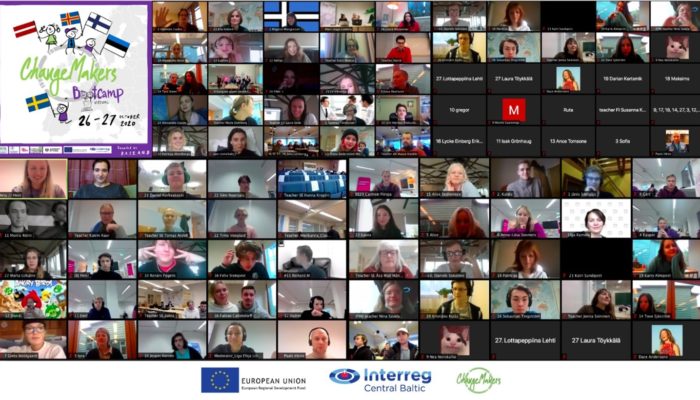
The Coronavirus pandemic demands creativity and flexibility from all of us when we cannot meet in person any longer and need to switch to online meetings and events. Just recently, 120 upper secondary school students (15-18 years old) of four different countries around the Baltic Sea — Finland (incl. Åland), Sweden, Latvia, and Estonia — attended an online Boot Camp to kick start one of the greatest contests of their lives in a project called ChangeMakers!
ChangeMakers is a Central Baltic Interreg project, funded by the European Union, that aims to enhance the spirit of entrepreneurship with focus on sustainability, circular economy, water sectors, and reuse-reduce-recycle. The project started in 2020 and runs over two years led by the University of Turku in partnership with Stockholm University, Satakunta University of Applied Sciences (SAMK), Tallinn University of Technology (Taltech), Riga Technical University, and Åland’s vocational high school. Within this project and during two school years, 250 students will form 50 cross-border teams to establish ‘mini’ start-ups and develop business solutions to global environmental challenges with a specific focus on the Baltic Sea. Local companies and organisations – e.g. the Environmental Protection Agency (EPA) of Sweden, Lovia, and Fifax Ab, — have partnered the project assisting the students with their start-ups.
As part of the original project plan, the first round of students would meet in a Boot Camp in Riga, Latvia, where the students would get to know each other, form their international teams, and sketch their first ideas. Due to the Coronavirus pandemic, it was unfortunately impossible to hold such an event physically. Instead, for two days in October, students from Värmdö Gymnasium in Stockholm, Sweden, attended the online Boot Camp at the Department of Physical Geography, Stockholm University, where they joined 120+ participants online, including students from other involved countries as well as teachers, project partners, and company representatives.
As a central activity, 14 environmental challenges were presented which had been defined by the project partners in collaboration with local companies and organisations from whom a representative also joined the online Boot Camp. Defined challenges cover a wide range of environmental issues both within the Baltic countries and beyond, including hydrological and water management challenges such as the use of excess rainwater, plastic pollution of stormwater discharge into the Baltic Sea, as well as eutrophication and invasive species issues concerning the Baltic Sea. Furthermore, problems regarding textile waste, the efficiency of different industries, usage of disposable cups or silage packaging, as well as how to cut down fossil fuels were also introduced to the students. After learning about different environmental challenges, the students chose a challenge, formed cross-border teams and drafted their initial ideas about founding a mini company and how to tackle solutions to their environmental challenge.
The ChangeMakers Boot Camp was hosted and moderated by the representatives of Riga Technical University who ensured that the students learned about innovation, teamwork, and entrepreneurship in a meaningful way. Organising a Zoom call with 120+ teenagers for two days is of course a challenge, but several online tools, like Mentimeter or Miro boards, helped to engage everyone. Furthermore, the founder of Angry Birds, Peter Vesterbacka, joined us and gave an inspirational speech about entrepreneurship and initiating things that seem impossible in the beginning. The students showed great interest and creativity to work on the presented environmental challenges, and were curious to talk to their new teammates from other countries. Over the coming months, the student teams will continue working on their mini company ideas in collaboration with mentors and project partners. In Sweden, the Swedish Environmental Protection Agency (Naturvårdsverket) is part of the project and will assist students in addressing solutions with the two challenges of a fossil free planet and a plastic free Baltic Sea.
The teams will pitch their companies in a dragon’s den format (i.e. present their business ideas to a panel of experts and potential investors) to the project representatives and collaboration partners in April 2021 – hopefully face-to-face in Tallinn this time! The ChangeMakers Boot Camp was a great example of how we can conduct projects and events despite the current situation and that inspiration and passion for a sustainable future can also be spread online.
ChangeMakers project team at Stockholm University are Zahra Kalantari, Navid Ghajarnia, Samaneh Seifollahi, and Hanna Kreplin.
Find out more about the project:
https://sites.utu.fi/changemakers

Hanna Kreplin has a MSc of Physical Geography and Quaternary Geology and works as a project engineer for the ChangeMakers project. She is also engaged in research regarding the impacts of climate change on wetlands in the Arctic.

Navid Ghajarnia is the project manager for the ChangeMakers, and a researcher in hydrology, water resources and climate change at the Department of Physical Geography, Stockholm University.
Edited by Sina Khatami
